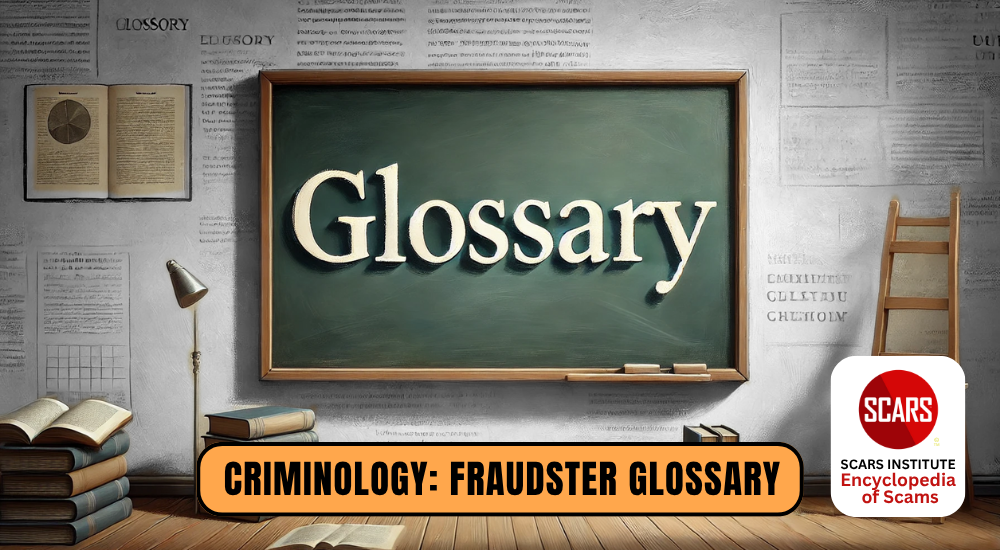
SCARS Institute’s Encyclopedia of Scams™ Published Continuously for 25 Years

SCARS™ Special Report: Work-at-Home Businesses Scams
Want to be your own boss? Earn thousands of dollars a month from home? Ads promote many different work-at-home jobs and businesses, but often the message is the same: they promise you’ll earn a great living from home, even in your spare time.
Don’t take their word for it — many of these “jobs” are scams, or don’t deliver on the claims they make. So do some research, and learn about common work-at-home scams.
What to Know About Work-at-Home Businesses
When money’s tight, a work-at-home opportunity might sound like just the thing to make ends meet. Some even promise a refund if you don’t succeed.
But the reality is many of these jobs are scams. You end up paying for starter kits or certifications that are useless, find your credit card is charged without your permission, or get caught up in a fake check scam.
Other work-at-home offers just don’t deliver on their promises. The ads don’t tell you that you may have to work a lot of hours without pay, or don’t disclose all the costs up-front. You might spend money based on promises you’ll quickly earn it back — but you don’t. People tricked by work-at-home ads have lost thousands of dollars, not to mention their time and energy.
Common Work-at-Home Scams
Internet Businesses
You’re told you can earn thousands of dollars a month starting your own internet business. The company says that no experience is necessary because they have experts to coach you, and you’re pressured to pay for the opportunity right away. Once you pay, the company says you won’t succeed unless you pay for more pricey services. Many people who pay for these “businesses” are left with a lot of debt and not much else.
Other work-at-home offers tell you that you can make money doing tasks like internet searches on prominent search engines and filling out forms. You just have to pay a small shipping and handling fee. Later on, you learn that the company isn’t connected with a well-known search engine like it claims — scammers are just lying to get your credit or debit card information. If you pay them even a tiny fee online, they can use your financial information to put additional charges on your card.
Envelope Stuffing
For a small fee, the ad says, you’ll make lots of money stuffing envelopes. But after you pay, you find out there is no work. Instead, you get a letter telling you to get other people to buy the same envelope-stuffing opportunity or some other product. You earn money only if those people respond the same way you did.
Assembly Or Craft Work
You see an ad that says you can make money assembling crafts or other products at home for a company that has promised to buy them. You may have to invest hundreds of dollars for equipment or supplies — like a sewing or sign-making machine from the company, or materials to make items like aprons, baby shoes, or plastic signs. Then you spend many hours making the “product.” But after you’ve bought your supplies and done the work, the company doesn’t pay you — supposedly because your work isn’t “up to standard.” Unfortunately, no work ever is, and you’re left with equipment and supplies, but no income.
Rebate Processing
The ad says you can earn money by helping to process rebates. The fee for training, certification, or registration is nothing compared to what you’ll earn, the ad promises. The “#1 certified work-at-home consultant” behind the program will show you how to succeed like she did. What you get instead are poorly written and useless training materials. There are no rebates to process, and few people ever get a refund.
Medical Billing
The ads promise a substantial income for full- or part-time work processing medical claims electronically — no experience needed. When you call the toll-free number, a sales rep tells you doctors are eager for help. In exchange for your investment of hundreds — or thousands — of dollars, the rep says, you’ll get everything you need to launch your own medical billing business, including the software to process the claims, a list of potential clients, and technical support.
But the companies rarely provide experienced sales staff or contacts in the medical community. The lists they give you often are out-of-date and include doctors who haven’t asked for billing services. The software they send might not even work. Competition in the medical billing market is fierce, and few people who make the investment are able to find clients or generate any income — let alone get back their investment.
Mystery Shopping
Ads for mystery shoppers say they want people who are willing to shop at certain stores or dine at certain restaurants, and then report on their experience in exchange for money. While there are some legitimate mystery shopping jobs, many are scams. Scammers might tell you that you need to pay for worthless certifications, directories, or job guarantees. Others are running fake check scams — they ask you to deposit checks and wire some of the money back, before you and the bank find out the check is fake, and you’re responsible for paying it back. You should never have to pay to get into the mystery shopping business.
Multilevel Marketing (MLM)
Another type of work-at-home opportunity is a multilevel marketing (MLM) plan. In multilevel or network marketing, you’re supposed to sell products to the public — often by word of mouth and direct sales. In legitimate MLM opportunities, you’ll earn commissions for the products you sell, and for sales made by people you recruit.
But not all multilevel marketing plans are legitimate. Some MLM companies tout luxurious lifestyles and suggest you’ll earn enough money to quit your job or meaningfully supplement your income. But are their claims for real? Be wary and ask for written information about how much money most people make (after deducting their expenses). Also, if anyone suggests recruiting is the real way to make money, know this: MLMs that survive on recruiting new participants rather than retail sales are pyramid schemes. Pyramid schemes are illegal, and the vast majority of participants lose money.
How to Know If It’s a Scam
Promises of a big income working from home, especially when the “opportunity” involves an up-front fee or giving your credit card information, should make you very suspicious. It doesn’t matter if the ad shows up in a trusted newspaper or website, or if the people you talk to on the phone sound legitimate. It still could be a scam.
If you’re thinking about following up on a work-at-home offer, do your homework. The FTC’s Business Opportunity Rule has safeguards in place to make sure you have the information you need to tell whether a work-at-home opportunity is a risky business. Under the Rule, sellers have to give you a one-page disclosure document that offers key pieces of information about the opportunity. Use the information in the disclosure document to fact-check what the seller tells you. In addition to reviewing the disclosure document, here are some questions to ask:
- What tasks will I have to perform? Are any other steps involved?
- Will I be paid a salary, or will I be paid on commission?
- What is the basis for your claims about my likely earnings? Do you survey everyone who purchased the program? What documents can you show me to prove your claims are true before I give you any money? Note: If a seller makes a claim about how much money a person can earn, the seller also has to give you an earnings claim statement with more specifics.
- Who will pay me?
- When will I get my first paycheck?
- What is the total cost of this work-at-home program, including supplies, equipment, and membership fees? What will I get for my money?
The answers to these questions may help you determine whether a work-at-home program is legitimate, and if so, whether it’s a good fit for you.
Check them out
It’s a good idea to research other people’s experience. Try entering the company or promoter’s name with the words “complaint,” “reviews,” or “scam” into a search engine. Read what others have to say. After all, it’s your money on the line.
You also might try checking out a company with your local consumer protection agency, your state Attorney General, or the Better Business Bureau — not only where the company is located, but also where you live. These organizations can tell you whether they’ve gotten complaints about a particular work-at-home program. But remember: just because there aren’t complaints doesn’t mean the company is legitimate. Dishonest companies sometimes settle complaints and change their names or move to avoid detection.
TAGS: SCARS, Important Article, Information About Scams, Anti-Scam, Scams, Scammers, Fraudsters, Cybercrime, Crybercriminals, Work-At-Home Scams, Scam Victims,
SCARS™ Editorial Team
Society of Citizens Against Relationship Scams Inc.
A Worldwide Crime Victims Assistance Nonprofit Organization
Visit: www.AgainstScams.org
Contact Us: Contact@AgainstScams.org
PLEASE SHARE OUR ARTICLES WITH YOUR FRIENDS & FAMILY
HELP OTHERS STAY SAFE ONLINE – YOUR KNOWLEDGE CAN MAKE THE DIFFERENCE!
The Latest SCARS Posts:
FIND MORE SCAM NEWS
«SCAMCRIME.COM»
JOIN US ON FACEBOOK
«CLICK HERE»
END
MORE INFORMATION
– – –
Tell us about your experiences with Romance Scammers in our
« Scams Discussion Forum on Facebook »
– – –
FAQ: How Do You Properly Report Scammers?
It is essential that law enforcement knows about scams & scammers, even though there is nothing (in most cases) that they can do.
Always report scams involving money lost or where you received money to:
- Local Police – ask them to take an “informational” police report – say you need it for your insurance
- U.S. State Police (if you live in the U.S.) – they will take the matter more seriously and provide you with more help than local police
- Your National Police or FBI « www.IC3.gov »
- The SCARS|CDN™ Cybercriminal Data Network – Worldwide Reporting Network on « www.Anyscam.com »
This helps your government understand the problem, and allows law enforcement to add scammers on watch lists worldwide.
– – –
To learn more about SCARS visit « www.AgainstScams.org »
Please be sure to report all scammers
on « www.Anyscam.com »
Disclaimer:
SCARS IS A DIGITAL PUBLISHER AND DOES NOT OFFER HEALTH OR MEDICAL ADVICE, LEGAL ADVICE, FINANCIAL ADVICE, OR SERVICES THAT SCARS IS NOT LICENSED OR REGISTERED TO PERFORM.
IF YOU’RE FACING A MEDICAL EMERGENCY, CALL YOUR LOCAL EMERGENCY SERVICES IMMEDIATELY, OR VISIT THE NEAREST EMERGENCY ROOM OR URGENT CARE CENTER. YOU SHOULD CONSULT YOUR HEALTHCARE PROVIDER BEFORE FOLLOWING ANY MEDICALLY RELATED INFORMATION PRESENTED ON OUR PAGES.
ALWAYS CONSULT A LICENSED ATTORNEY FOR ANY ADVICE REGARDING LEGAL MATTERS.
A LICENSED FINANCIAL OR TAX PROFESSIONAL SHOULD BE CONSULTED BEFORE ACTING ON ANY INFORMATION RELATING TO YOUR PERSONAL FINANCES OR TAX RELATED ISSUES AND INFORMATION.
This content and other material contained on the website, apps, newsletter, and products (“Content”), is general in nature and for informational purposes only and does not constitute medical, legal, or financial advice; the Content is not intended to be a substitute for licensed or regulated professional advice. Always consult your doctor or other qualified healthcare provider, lawyer, financial or tax professional with any questions you may have regarding the educational information contained herein. SCARS makes no guarantees about the efficacy of information described on or in SCARS’s Content. The information contained are subject to change and are not intended to cover all possible situations or effects. SCARS does not recommend or endorse any specific professional or care provider, product, service, or other information that may be mentioned in SCARS’s websites, apps, and Content unless explicitly identified as such.
The disclaimers herein are provided on this page for ease of reference. These disclaimers supplement and are a part of SCARS’s websites Terms of Use.
Legal Notices:
All original content is Copyright © 1991 – 2020 Society of Citizens Against Relationship Scams Inc. (D.B.A SCARS) All Rights Reserved Worldwide & Webwide. Third-party copyrights acknowledge.
SCARS, SCARS|INTERNATIONAL, SCARS, SCARS|SUPPORT, SCARS, RSN, Romance Scams Now, SCARS|WORLDWIDE, SCARS|GLOBAL, SCARS, Society of Citizens Against Relationship Scams, Society of Citizens Against Romance Scams, SCARS|ANYSCAM, Project Anyscam, Anyscam, SCARS|GOFCH, GOFCH, SCARS|CHINA, SCARS|CDN, SCARS|UK, SCARS|LATINOAMERICA, SCARS|MEMBER, SCARS|VOLUNTEER, SCARS Cybercriminal Data Network, Cobalt Alert, Scam Victims Support Group, are all trademarks of Society of Citizens Against Relationship Scams Inc.
Contact the law firm for the Society of Citizens Against Relationship Scams Incorporated by email at legal@AgainstScams.org
-/ 30 /-
What do you think about this?
Please share your thoughts in a comment below!
Table of Contents
- What to Know About Work-at-Home Businesses
- Common Work-at-Home Scams
- How to Know If It’s a Scam
- Check them out
- Ethereum ETHM Token Trap and Pig Butchering Scams – 2026
- New U.S. Law – S.3643 – 118th Congress – Will Dramatically Impact Scammers and Terrorists – 2026
- How Scam Survivors Can Survive Valentine’s Day – 2026
- U.S. Veterans Benefits Scams – 2026
- New AI Voice Cloning Phone Scams – 2026
- An Essay on Justice and Money Recovery – 2026
- Tell us about your experiences with Romance Scammers in our
« Scams Discussion Forum on Facebook » - FAQ: How Do You Properly Report Scammers?
- Please be sure to report all scammers
on « www.Anyscam.com »
LEAVE A COMMENT?
Recent Comments
On Other Articles
- Arwyn Lautenschlager on Love Bombing And How Romance Scam Victims Are Forced To Feel: “I was love bombed to the point that I would do just about anything for the scammer(s). I was told…” Feb 11, 14:24
- on Dani Daniels (Kira Lee Orsag): Another Scammer’s Favorite: “You provide a valuable service! I wish more people knew about it!” Feb 10, 15:05
- on Danielle Delaunay/Danielle Genevieve – Stolen Identity/Stolen Photos – Impersonation Victim UPDATED 2024: “We highly recommend that you simply turn away form the scam and scammers, and focus on the development of a…” Feb 4, 19:47
- on The Art Of Deception: The Fundamental Principals Of Successful Deceptions – 2024: “I experienced many of the deceptive tactics that romance scammers use. I was told various stories of hardship and why…” Feb 4, 15:27
- on Danielle Delaunay/Danielle Genevieve – Stolen Identity/Stolen Photos – Impersonation Victim UPDATED 2024: “Yes, I’m in that exact situation also. “Danielle” has seriously scammed me for 3 years now. “She” (he) doesn’t know…” Feb 4, 14:58
- on An Essay on Justice and Money Recovery – 2026: “you are so right I accidentally clicked on online justice I signed an agreement for 12k upfront but cd only…” Feb 3, 08:16
- on The SCARS Institute Top 50 Celebrity Impersonation Scams – 2025: “Quora has had visits from scammers pretending to be Keanu Reeves and Paul McCartney in 2025 and 2026.” Jan 27, 17:45
- on Scam Victims Should Limit Their Exposure To Scam News & Scammer Photos: “I used to look at scammers photos all the time; however, I don’t feel the need to do it anymore.…” Jan 26, 23:19
- on After A Scam, No One Can Tell You How You Will React: “This article was very informative, my scams happened 5 years ago; however, l do remember several of those emotions and/or…” Jan 23, 17:17
- on Situational Awareness and How Trauma Makes Scam Victims Less Safe – 2024: “I need to be more observant and I am practicing situational awareness. I’m saving this article to remind me of…” Jan 21, 22:55
ARTICLE META
Important Information for New Scam Victims
- Please visit www.ScamVictimsSupport.org – a SCARS Website for New Scam Victims & Sextortion Victims
- Enroll in FREE SCARS Scam Survivor’s School now at www.SCARSeducation.org
- Please visit www.ScamPsychology.org – to more fully understand the psychological concepts involved in scams and scam victim recovery
If you are looking for local trauma counselors please visit counseling.AgainstScams.org or join SCARS for our counseling/therapy benefit: membership.AgainstScams.org
If you need to speak with someone now, you can dial 988 or find phone numbers for crisis hotlines all around the world here: www.opencounseling.com/suicide-hotlines
A Note About Labeling!
We often use the term ‘scam victim’ in our articles, but this is a convenience to help those searching for information in search engines like Google. It is just a convenience and has no deeper meaning. If you have come through such an experience, YOU are a Survivor! It was not your fault. You are not alone! Axios!
A Question of Trust
At the SCARS Institute, we invite you to do your own research on the topics we speak about and publish, Our team investigates the subject being discussed, especially when it comes to understanding the scam victims-survivors experience. You can do Google searches but in many cases, you will have to wade through scientific papers and studies. However, remember that biases and perspectives matter and influence the outcome. Regardless, we encourage you to explore these topics as thoroughly as you can for your own awareness.
Statement About Victim Blaming
SCARS Institute articles examine different aspects of the scam victim experience, as well as those who may have been secondary victims. This work focuses on understanding victimization through the science of victimology, including common psychological and behavioral responses. The purpose is to help victims and survivors understand why these crimes occurred, reduce shame and self-blame, strengthen recovery programs and victim opportunities, and lower the risk of future victimization.
At times, these discussions may sound uncomfortable, overwhelming, or may be mistaken for blame. They are not. Scam victims are never blamed. Our goal is to explain the mechanisms of deception and the human responses that scammers exploit, and the processes that occur after the scam ends, so victims can better understand what happened to them and why it felt convincing at the time, and what the path looks like going forward.
Articles that address the psychology, neurology, physiology, and other characteristics of scams and the victim experience recognize that all people share cognitive and emotional traits that can be manipulated under the right conditions. These characteristics are not flaws. They are normal human functions that criminals deliberately exploit. Victims typically have little awareness of these mechanisms while a scam is unfolding and a very limited ability to control them. Awareness often comes only after the harm has occurred.
By explaining these processes, these articles help victims make sense of their experiences, understand common post-scam reactions, and identify ways to protect themselves moving forward. This knowledge supports recovery by replacing confusion and self-blame with clarity, context, and self-compassion.
Additional educational material on these topics is available at ScamPsychology.org – ScamsNOW.com and other SCARS Institute websites.
Psychology Disclaimer:
All articles about psychology and the human brain on this website are for information & education only
The information provided in this article is intended for educational and self-help purposes only and should not be construed as a substitute for professional therapy or counseling.
While any self-help techniques outlined herein may be beneficial for scam victims seeking to recover from their experience and move towards recovery, it is important to consult with a qualified mental health professional before initiating any course of action. Each individual’s experience and needs are unique, and what works for one person may not be suitable for another.
Additionally, any approach may not be appropriate for individuals with certain pre-existing mental health conditions or trauma histories. It is advisable to seek guidance from a licensed therapist or counselor who can provide personalized support, guidance, and treatment tailored to your specific needs.
If you are experiencing significant distress or emotional difficulties related to a scam or other traumatic event, please consult your doctor or mental health provider for appropriate care and support.
Also read our SCARS Institute Statement about Professional Care for Scam Victims – click here to go to our ScamsNOW.com website.























Thank you for your comment. You may receive an email to follow up. We never share your data with marketers.